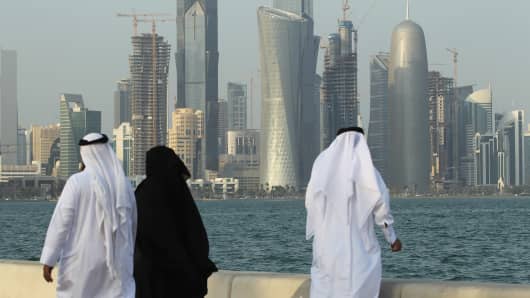CNBC - A fierce spat between Qatar and leading Arab nations could see Doha shift closer to Turkey and Iran in a move that could alter Middle Eastern politics.
Seven countries, including Saudi Arabia, the United Arab Emirates, Egypt, and Bahrain, severed diplomatic ties with with the energy-rich monarchy on Monday, accusing it of backing Tehran and Islamist groups such as the non-violent Muslim Brotherhood. Qatar has said it does not support terrorism, adding that the diplomatic rift was based on "baseless fabricated claims."
Doha now faces an acute economic plight as it relies on Gulf neighbors for 80 percent of food imports, according to Reuters.
To mitigate its economic isolation, Qatar will look for other friends, explained Amin Saikal, director of the Center for Arab and Islamic Studies at the Australian National University. "It can accelerate its relationship with Turkey and Iran, who have already said they are happy to help to compensate for the boycott."
Ankara was ready to help resolve the dispute, said Turkish Foreign Minister Mevlut Cavusoglu, while Iranian officials have offered to send food to Qatar by sea.
"Doha would have to clearly shift its foreign policy position and alliances ... Pressure by the Arab alliance could convince the (Qatari) leadership to seek closer relations with Iran and Turkey," Eurasia analysts echoed in a Monday note.
"As a result, Qatar could leave the Gulf Cooperation Council altogether."
The majority of Arab governments have long viewed Iran as an adversary and in 2016, Doha recalled its ambassador to the Persian nation amid a major rift between Riyadh and Tehran. But recent months have seen Qatari Emir Sheikh Tamim bin Hamad Al-Thani go against Riyadh's wishes by warming up to Tehran � in a conversation with Iranian President Hassan Rouhani last week, Al-Thani said he wanted bilateral liaisons to be stronger than ever.
[caption id="" align="aligncenter" width="530"]
 Getty Images Doha, Qatar.[/caption]
Getty Images Doha, Qatar.[/caption]Qatar and Iran also share management of the world's largest gas field, South Pars, in the Persian Gulf.
But if Al-Thani cozies up to Turkish President Tayyip Erdo?an and Rouhani, as predicted, that may further inflame regional tensions.
"Turkish diplomatic efforts with Riyadh would face challenges because Ankara and Riyadh would struggle to find common ground on the Muslim Brotherhood issue, since the Justice and Development Party ( Erdo?an's party) is perfectly aligned with Doha on it," Eurasia said.
Meanwhile, friendlier Doha-Tehran links could impact Al-Thani's alliance with Washington.
"That will place the U.S. in a serious dilemma. The U.S. has major military bases in Qatar but at the same time, it wants to maintain close ties with Saudi Arabia," said Saikal. Qatar's Al Udeid Air Base hosts 11,000 American personnel and is one of Washington's largest military bases in the Middle East.
Tehran may also look to strategically benefit from the Gulf fall-out.
The Islamic republic has been worried about the creation of an "Arab-NATO" as President Donald Trump seeks to unite Muslim countries against Tehran but the current Saudi-Qatar quarrel provides relief to Tehran, Ahmad Majidyar, a fellow with the Middle East Institute, a Washington-based think-tank, said in a Monday note.
During a visit to Riyadh last month, the U.S. president urged Arab governments to isolate Iran, a nation that "fueled the fires of sectarian conflict and terror," and called on nations to fight terrorism � comments that many believe helped spark the current Gulf crisis.
"Tehran views the heightening tension between Qatar and other regional Arab powers as an opportunity to weaken the Gulf Cooperation Council and the U.S.-Arab alliance created during Trump's last trip to Riyadh to fight terrorism and counter Iran and its proxies in the region," Majidyar said.
Iranian state-run media has been urging the Rouhani government to exploit inter-Arab rivalry to weaken the anti-Iran alliance, he continued.
However, it may be too early to jump to conclusions, Majidyar stated, noting how Riyadh and Doha have previously resolved disputes through dialogue.










